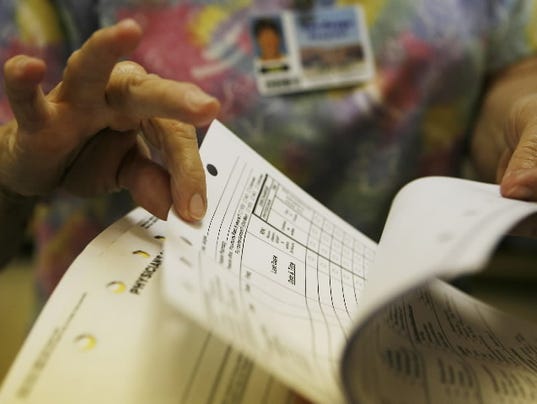 |
| A nurse at a hospital in Osceola, Mo., in 2009. (Photo: Orlin Wagner, AP) |
From intelligence agencies to hospitals, paper records are the killer app for stopping hackers.
" 'Trust us with more data,’ say government agencies hacked by a 16-year-old.” That's the headline on a piece by TechDirt’s Tim Cushing. The aforementioned teen managed, as Cushing reports, to “dive into the servers of two of America's most secure federal agencies and fish out their internal files. This 16-year-old is allegedly part of the same crew that socially engineered their way into the inboxes of CIA Director John Brennan, national intelligence Director James Clapper, and the administration's senior adviser on science and technology, John Holdren."
But there’s a paradox, says Cushing, because “we also — somehow — live in a world where these same agencies are arguing they should be entrusted with massive amounts of data — not just on their own employees but on thousands of U.S. citizens.”
They’re better at gathering the data than they are at keeping them secure. Part of this is because they face no real accountability. My wife, a psychologist, faces ruinous penalties if her negligence allows patient data to escape. The government, not so much.
But the other problem is that computerized data are inherently insecure. And that goes beyond simple data theft. Hollywood Presbyterian Medical Center in Los Angeles was hit by an infection of “ransomware,” which locked up all its data in encrypted form until a ransom (hence the name) was paid to the software deployers to decrypt the data again. As Engadget reported, “The hospital isn't saying exactly when it paid the ransom, but it looks like they waited at least a week to end the file hostage situation. Hollywood Presbyterian said its payment was 40 bitcoin, around $17,000 (not the 9,000 in bitcoin/$3.6 million initially reported). During this time, an unnamed doctor told the press the systems responsible for CT scans, documentation, lab work, pharmacy functions and electronic communications were out of commission — as in, no email. Staff relied on pencil and paper; it was reported that radiation and oncology were temporarily shut down.”
This is pretty serious. Maybe Hollywood Presbyterian could have done a better job of protecting its data, but data on computers can never be perfectly safe. Thus, I propose a more secure technology that would serve as a near-perfect barrier to hackers, ransomware and other exploits: Put important records back on paper.Read the rest of the story HERE.
If you like what you see, please "Like" us on Facebook either here or here. Please follow us on Twitter here.




1 comment:
Great idea. Right Speak can be printed on paper, distributed at the local convenience stores.
Post a Comment